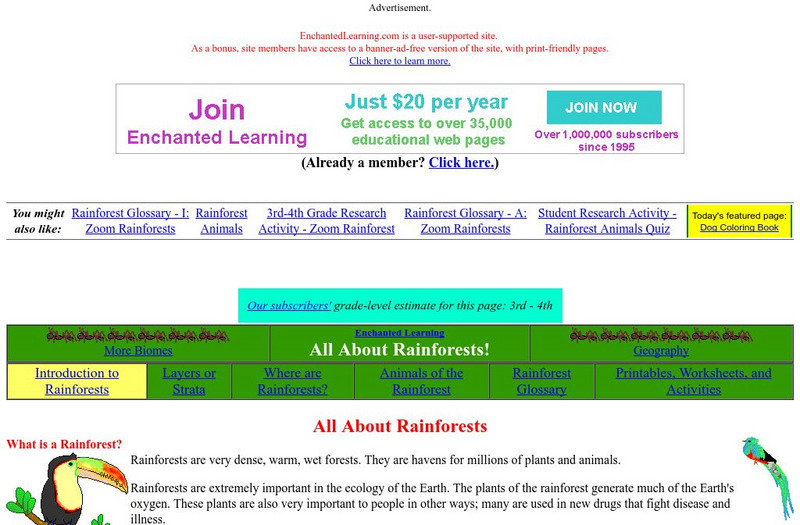Hi, what do you want to do?
Curated OER
Guetemala's Changing Forest
Eighth graders compare their local ecological zone to the tropical rainforest. In this natural ecology lesson, 8th graders complete an activity about the differences in ecological zones. They compare their biome to the Guatemalan...
Alabama Learning Exchange
Scrapping the Biomes
Fifth graders investigate biomes of the earth. For this biomes lesson, 5th graders explore eight different biomes which include the tropical rain forest, deciduous forest, grasslands, and taiga. They design an artistic scrapbook that...
Curated OER
Equadorian Rainforest: The Tropical Supermarket
Learners study the concept of sustainable agricultural practices through cocoa farming and the lives of the people who are the producers. Students watch a slide show and read a story which helps them understand the origins of chocolate,...
Bowland
Mission: Rainforest
Young environmentally conscious mathematicians solve a variety of problems related to the central theme of uncovering illegal logging activities. They determine a base camp based on given constraints, investigate logging activities and...
Living Rainforest
Finding the Rainforests
From Brazil to Indonesia, young scientists investigate the geography and climate of the world's tropical rain forests with this collection of worksheets.
Curated OER
Going...going...gone? Tropical Rainforests-How They Work, What They Do for Us, What's Being Done to Them...
Sixth graders explore the Tropical Rainforest and come to understand what it is and how it affects the ecosystem. In this rainforests lesson plan, 6th graders write about the Tropical Rainforest, imagine they are in the Tropical...
Curated OER
Plants of the Tropical Rainforest
Students experiment with the growth of philodendron plants in different amounts of sunlight. They complete a gardening notebook including plant sketches and growth data.
Curated OER
El Salvador: Whose Breakfast Isn't for the Birds?
Sixth graders investigate the understanding of where coffee is grown by conducting a survey. They study the natural history of coffee and examine bird habitats in the areas where coffee is grown. They write letters to explaining the...
Curated OER
Building our Rainforest
Young scholars apply their math and measuring skills to create "tree trunk" panels for their tropical rain forest. They use their recorded information to construct strips of paper that are correct height.
Curated OER
Rainforest
Students explore and study an activity that reinforces counting skills and drawing rain forest animals in their math storybooks. They brainstorm what type of animals they think they'd see in the rain forest, birds as well as colors. Each...
Curated OER
Rainforest Realities
Students gather information about the rainforest and the environment from the Internet. They analyze the impact that humans have on the environment. They also collect and organize data they find on the rainforest.
Curated OER
The Ancient Maya
Students explore the culture of the Mayans through a variety of activities. In this activity about Maya, students analyze pictures in books and on websites, produce scale models of Maya architecture, and create Maya mosaics. Students...
Curated OER
One Square Meter
Students examine various ecosystems using scientific inquiry. Using the local area, they assess the characteristics and conditions in one square meter. They report their findings in the form of a survey map and data sheet. They...
Rainforest Alliance
Forests of Guatemala
With 90 percent of its land area covered in forests, Suriname, a country in South America, contains the largest percentage of forests throughout the world. Here is an activity that brings classmates together to learn about the...
Curated OER
Honduras: Going Bananas
Students explore the popularity of bananas. They conduct a survey to understand the reasons for their popularity. Students research a banana's journey from the farm to school lunch. They compose a children's book about bananas explaining...
Enchanted Learning
Enchanted Learning: All About Rainforests
Basic information on the rainforests include a definition, the strata, the animals, their location, rainfall, temperature and importance. Content also includes animal printouts, quizzes, a puzzle, and math activities.




















